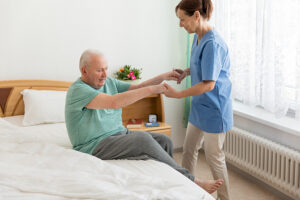January 24, 2023

Learn how to protect aging skin by preventing bed sores in older adults.
Bed sores affect as many as one in every ten older adults and are even more common in people who smoke, are living with a chronic illness like diabetes, or who have fragile or thin skin. Bed sores are not merely extremely painful – they can easily progress to infections that can become life-threatening, so preventing bed sores is extremely important.
Bed sores are the result of insufficient blood flow when remaining in one place for an extensive period of time. For those with restricted mobility or who are bed- or wheelchair-bound, the battle against bed sores can feel endless. However, it is crucial for those caring for an elderly loved one to learn about preventing bed sores. So how can you prevent pressure sores in older adults? These guidelines can help protect an older adult’s sensitive skin from painful and dangerous sores:
Change Positions Frequently
- Help the individual change position every couple of hours if confined to a bed, or every hour if wheelchair-bound.
- Use lifting devices to avoid friction while repositioning.
Utilize Supportive Devices
- Place specialized cushions and pads:
- Underneath calves to protect the heels
- Between ankles and knees
- To lie at an angle, to protect the hips
Practice Skin Care
- Clean the skin with a gentle soap and warm water, and apply lotion.
- If the skin is too moist, apply talcum powder.
- Massage areas prone to bed sores to increase circulation.
Help With Healthy Eating and Active Living
- Consult with the person’s health care provider for dietary and supplement tips for optimum skin health.
- Encourage the person to quit smoking.
- Ensure good hydration.
- Implement daily exercises per doctor’s recommendations.
If the person does get a pressure sore despite taking the proper precautions, it may progress through these four stages:
- Stage 1: A bruise-like patch will develop on the skin which may be warmer compared to surrounding skin. This area may itch or burn.
- Stage 2: An open sore appears from the bruise. This can look like a blister or abrasion and be painful and discolored.
- Stage 3: As the sore becomes worse, the surrounding skin becomes darker, and the area is deepened.
- Stage 4: During this stage, damage occurs to the muscle, bone, and/or joints, and a bone infection called osteomyelitis or even sepsis (a life-threatening blood infection) could occur.
Contact the person’s health care provider immediately if a pressure sore develops. Continuum can also help by providing daily skin inspections to help detect vulnerable areas of the skin and the early signs and symptoms of bed sores. Our team can also help with transferring, position changes, and walking to minimize the risk of developing pressure sores.
Our professional home care services and care team are just a phone call away. Contact us today at (314) 863-9912 or (636) 861-3336 to learn more about our help at home in St. Charles and the surrounding communities.
